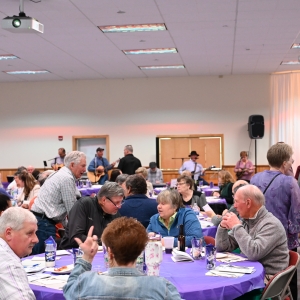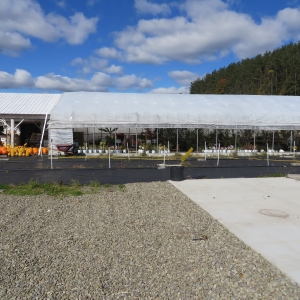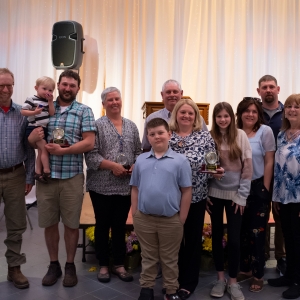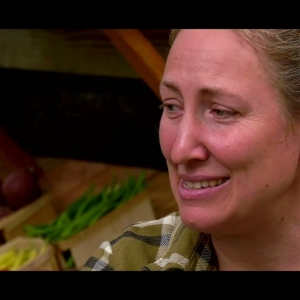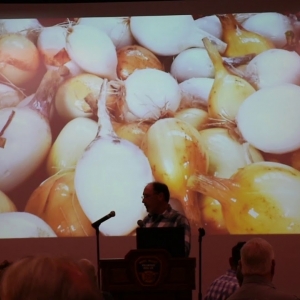Other Ag News:
As in years past, National Sustainable Agriculture Coalition (NSAC) members gathered in Washington, DC on February 10-13, 2025, for our annual winter meeting. This event offered NSAC members the opportunity to connect and work on strategy for shared priorities and collective actions. It was also a vital opportunity to take to Capitol Hill and engage directly with Members of Congress to educate them on important issues and policy impacts. An especially timely topic of conversation for NSAC members and farmers visiting the Hill this year was the Trump Administration’s ongoing funding freeze implemented through a flood of Executive Orders and efforts of the Department of Government Efficiency to terminate lawful, signed contracts between USDA and community organizations nationwide.
During opening remarks, Coalition Director Sarah Hackney offered grounding in the Coalition’s 35-year history of achievements, conducted in a nonpartisan manner across many administrations and political moments, always in service of the interests of sustainable farmers and ranchers along with rural and urban communities. She emphasized that NSAC remains committed to integrity, stewardship, collaboration, and justice. Part of living these values includes holding firm in our commitment to advancing equity in food and agriculture policy. Policy decisions over history have disenfranchised many members of our society — and, in turn, hard won reforms, investments, and programs by NSAC and the broader movement can help address these injustices and build a more resilient, sustainable, equitable food and farm system that benefits everyone. The Coalition remains steadfast in our commitment to representing our communities and prioritizing these issues as central to our work.
Members awaiting an NSAC tradition – the DC ReportAs at every member meeting, NSAC Policy Director Mike Lavender provided updates and context on the prospects of a new farm bill based on the current political moment. He also offered our members some insight about upcoming expected legislation, such as the budget reconciliation, and how it might impact our priorities.
CampaignsIf you follow NSAC, you are familiar with the three grassroots campaigns the Coalition has been working on for a few years now. At our most recent policy council meeting, these priorities were reaffirmed, signaling our continued commitment to policy that invests in resilient local and regional food systems, levels the playing field for small- and mid-sized farms, advances equity and opportunity across the food system, and helps build a climate-resilient future.
The funding freeze has galvanized our efforts to make sure that the immediate impacts of the funding freeze are addressed – by demanding the release of funding owed on all signed agreements – and that the programs our members and their farmers and communities rely on continue to be funded and function well through the annual appropriations process and the next farm bill reauthorization.
Lobby DayAlthough a snowstorm blanketed Washington, DC during the meeting, by Wednesday morning most of the roads had been cleared and except for a few delays and shifts, NSAC members and farmer advocates brought their voices to Capitol Hill, holding meetings with nearly 150 Members of Congress. Funding freezes were top of mind for many members and the prospect of snow was not going to deter them from making their way to the Capitol. Many of us breathed a collective sigh of relief as we realized early on February 12 that these meetings were set to go.
DC blanketed in snow on Lobby DayThis year, in addition to roughly 100 representatives from NSAC member organizations, we had over 30 farmers in attendance from 17 states join our lobby day. The common element throughout these meetings was how important USDA programs and staff are to their farms, communities, and families. They emphasized the urgent need for Congress to step in and ensure USDA releases all funds owed under signed agreements.
NSAC members ready for Lobby DayIn a story that highlighted NSAC member Pasa sustainable Agriculture, Pasa Executive Director Hannah Smith-Brubaker highlighted how much of USDA programming has focused on large farms, but that the funding freeze has affected programs that were designed to reach out to and help small farmers for the Partnership for Climate-Smart Commodities Program. Pasa staff brought those concerns to Capitol Hill when they met with Pennsylvania lawmakers during the NSAC lobby day.
Grassroots Plenary and Farmer PanelThere is always interest from NSAC members to share lessons learned with each other about their experiences meeting with members of Congress. In an effort to uplift voices from the ground and hear from those most affected by agriculture policy, the Winter Meeting included a farmer panel to hear from members and some of the farmers who made their way to Washington, DC this year. The panel included Jeremy Adams, President of the Arkansas Farmers Market Association, Raymond Kelley of Cheyenne Cattle Company and Conway Wholesale Produce, Adam Peterson, Food Systems Policy Manager at Chicago Food Policy Action Council, and Daviiid Toledo, President of Contemporary Farmer, Inc.
Farmer Panelists Addressing NSAC MembersDuring the panel, farmers and advocates highlighted the need to address the funding freeze and funding cuts, noting the strain and uncertainty they place on communities throughout the US. Raymond Kelley urged members of Congress to address these issues. “I wish they had a better understanding of the importance of having bills passed. It’s a waste of time. There are a lot of urgent things that farmers need,” he said.
Daviiid Toledo reflected on the fragility of life in the US and uplifted how SNAP benefits people from all walks of life:
“There are so many people using SNAP that we need to remember that and paint that picture that it’s college students, that it’s AmeriCorps, they’re seniors. There are people in between. Your house could burn down from one day to the next and everything that you built could be gone. American life is fragile and when it comes to SNAP they need to understand those real-life stories that could happen to them or to anybody.”
Adam Peterson, for his part, while eating in the Rayburn House Office Cafeteria, noticed the offerings were the same as almost every other institutional meal program found in hospitals or institutions of higher education. He wondered then how in a place that has so much power and influence as the US Senate, where he had his lunch in the middle of the day between meetings, people are eating the same institutional food as everywhere else:
“It hit me that this is the way that this is – what the majority of people are eating – and this is the system that we’re living in… and how is no one championing change there? It’s not a little thing, but it is the intersectionality of food. It’s housing, transportation, dignity, and sovereignty. It’s 90 percent of what people eat.”
Jeremy Adams hoped Congress would reconnect with the reality that the majority of people in the US live with and face. “They need to see what reality is like on the ground. They have been elevated from the rest of us for too long and they just don’t understand what it’s like any more,” he said. “I think everyone in Congress who wants to cut funding for nutrition programs should do the SNAP challenge for two weeks and see what the people who have to rely on those programs have to do to survive… and for them to do a pickoff with the migrant labor that we rely on.”
Member AwardMany NSAC members have been fierce advocates of our coalition’s priorities for decades, and know the weeds (pun fully intended) of the policy and technical knowledge work – truly the backbone of our movement. One of those figures is Mark Schonbeck of the Virginia Association for Biological Farming (VABF) and the Organic Farming Research Foundation (OFRF), who this year received the NSAC’s first-ever Perennial Advocate Award. The award honors members who have meaningfully and consistently participated in our coalition’s work over many years. Some of that participation includes having taken part in more than one farm bill campaign, having participated consistently, providing meaningful insight, and cultivating Congressional champions.
Sarah Hackney, Coalition Director, and Mark Schonbeck, recipient of the Perennial Advocate AwardThe award was introduced by Coalition Director, Sarah Hackney. NSAC’s founding Policy Director, Ferd Hoefner spoke of all the ways that Mark has helped the coalition with his technical knowledge, providing comments and technical expertise through decades of work in the Coalition as part of VABF and the OFRF. The award was formally presented by Margaret Krome of the Michael Fields Agricultural Institute who shared some of their personal experiences as longtime friends and allies in our movement. Mark has been involved with the VABF in various positions, including board member, newsletter editor, and policy liaison. With a solid scientific background and eye, he has made significant contributions to NSAC, our movement, and to farm policy that works for farmers and growers. Recently, Mark co-presented with NSAC staff at the VABF Conference in Roanoke, VA.
Mark, who is always humble, accepted the award with deep gratitude for the coalition as a whole, and that he looked forward to recognizing others as or more deserving than him of this recognition. We are truly lucky to have such thought leaders in our movement. Congratulations to Mark again from everyone at NSAC.
NSAC Happy Hour at Clubhouse in Georgetown was a fun time to connect and unwindAs we wrapped up with a final round of commitments and next steps, NSAC staff and members felt energized for our continued work and advocacy ahead, understanding that we are facing unusual challenges but that, now more than ever, we need to lean on each other to continue to build our community and our movement. We also committed to take each other to task and we will continue to do so.
The post NSAC Members Meet for Annual Winter Meeting appeared first on National Sustainable Agriculture Coalition.
WASHINGTON, March 13, 2025 – In her first month, U.S. Secretary of Agriculture Brooke Rollins has moved swiftly to advance key priorities focused on efficiency and agricultural prosperity. From addressing industry challenges to streamlining government operations, she has focused on policies that reinforce the U.S. Department of Agriculture’s (USDA) commitment to serving America’s farmers, ranchers, and rural communities.
WASHINGTON, Mar. 13, 2025 – The U.S. Department of Agriculture (USDA) announced that people recovering from recent severe storms, straight-line winds, flooding, landslides and mudslides may be eligible for food assistance through USDA’s Disaster Supplemental Nutrition Assistance Program (D-SNAP). Nearly 3,000 households in four counties in West Virginia are estimated to be eligible for this relief to help with grocery expenses.
Atlanta, GA, March 12, 2025 – Today, U.S. Secretary of Agriculture Brooke Rollins traveled to Atlanta, Georgia to deliver remarks to the National Rural Electric Cooperative Association (NRECA). Secretary Rollins and Georgia Commissioner of Agriculture Tyler Harper then met with elected officials at the Georgia State Capitol, participated in a roundtable discussion with farmers, and toured a local cattle operation.
WASHINGTON, March 11, 2025 – Today, following the inaugural meeting of the Make America Healthy Again Commission, U.S. Secretary of Agriculture Brooke Rollins and U.S. Secretary of Health and Human Services Robert F. Kennedy, Jr. announced their continued work on the 2025-2030 Dietary Guidelines for Americans (Guidelines).
For Immediate Release
Contact: Laura Zaks
National Sustainable Agriculture Coalition
press@sustainableagriculture.net
Release: NSAC Responds to Termination of Critical Local Food Funding, Envisions Future for Popular ProgramWashington, DC, March 11, 2025 – Today, the National Sustainable Agriculture Coalition (NSAC) lamented the termination of previously announced funding for the Local Food for Schools and Child Care Cooperative Agreement (LFSCC) and Local Food Purchase Assistance Cooperative Agreement program (LFPA). On Friday, March 7, the US Department of Agriculture (USDA) notified States, Territories and Tribes of the termination of previously announced 2025 funding for LFSCC and LFPA, stating that it no longer effectuates the Department’s priorities.
“USDA’s decision to re-initiate reimbursements on signed LFPA and LFS contracts is a welcome development, yet the termination of the LFPA25 cooperative agreements misses a key opportunity to bolster opportunities for farmers seeking financial stability through new and expanded domestic markets. LFPA is an incredibly popular program, generating enormous economic opportunities by fostering regional supply chains and investing in local farmers. We’re eager to get to work envisioning a future for these essential investments that support direct purchases and allow farmers to retain a larger share of the dollar,” said Mike Lavender, NSAC Policy Director.
These programs stabilize local food supply chains by supporting regional food purchases for schools, food pantries, community kitchens, and other assistance efforts. Beyond meeting a direct short-term need, these programs spurred business development and significant economic impact by directing hundreds of millions of federal dollars into the hands of small businesses and producers nationwide. These programs have demonstrated their success in promoting rural prosperity and farmer viability, which led to the allocation of additional funding through LFPA 2025 and LFSCC 2025.
“The decision to terminate the latest round of LFPA and LFSCC funding will have profoundly harmful economic impacts nationwide. Farmers and businesses have invested their own resources to scale operations to respond to local need and meet demand. This decision comes at a time where many have already planted for the upcoming season and may leave a substantial market gap for producers,” commented Hannah Quigley, NSAC policy specialist.
###
The National Sustainable Agriculture Coalition is a grassroots alliance that advocates for federal policy reform supporting the long-term social, economic, and environmental sustainability of agriculture, natural resources, and rural communities. Learn more and get involved at: https://sustainableagriculture.net
The post Release: NSAC Responds to Termination of Critical Local Food Funding, Envisions Future for Popular Program appeared first on National Sustainable Agriculture Coalition.
WASHINGTON, March 11, 2025 – The U.S. Department of Agriculture (USDA) released the following statement today regarding the status of probationary employees:
Every year, National Groundwater Awareness Week (March 9-15, 2025) advocates for the sustainable management and testing of groundwater to promote safe, reliable water sources. Groundwater provides a source for drinking water, irrigation and food production, making it a vital resource for rural communities. Without responsible, routine testing for contamination, however, groundwater can pose significant environmental and health risks that require immediate attention.
Asheville, NC, March 7, 2025 – U.S. Secretary of Agriculture Brooke Rollins surveyed natural disaster damage and met with U.S. Forest Service members in Western North Carolina yesterday, where recent wildfires and hurricanes have caused significant destruction. During her visit, Secretary Rollins toured the Blue Ridge Parkway to witness the devastation left by Hurricane Helene. She then received a wildfire operational briefing and participated in a U.S. Forest Service roundtable with local leaders in Asheville.
For Immediate Release
Contact: Laura Zaks
National Sustainable Agriculture Coalition
press@sustainableagriculture.net
Release: NSAC Holds Briefing as USDA Funding Freeze and Layoffs Threaten Farmers and Communities NationwideWashington, DC, March 6, 2025 – Today, the National Sustainable Agriculture Coalition (NSAC), a coalition of more than 150 farm, food, conservation, and rural organizations, held a virtual briefing on how the US Department of Agriculture (USDA) funding freeze and employee layoffs are affecting farmers and ranchers.
Panelists – who called on USDA to end the freeze and release funding on all signed contracts – included farmers from North Carolina, Arkansas, Wisconsin, Nebraska, and California. These farmers shared their own stories of how the ongoing federal funding freeze – in addition to significant layoffs at USDA – has created challenging and often dire circumstances for farmers and communities from coast to coast, threatening farm viability and livelihoods.
Rachel Bouresssa of Wisconsin said “I have EQIP and CSP contracts. I also work with organizations with RCPP agreements. At a time that I am looking forward to the growing season ahead, I am unsure if many of my contacts will be paid. … It’s not just my work. There are many small businesses, from excavating companies to plumbers, engineers, and suppliers that will also be impacted and they may not even know it yet. These are small businesses in rural communities.
“The NRCS in Arkansas, we depend on it. It has saved our farm a couple of times because it’s allowed us to implement programs and conservation that have allowed us to cut inputs like herbicides and fertilizers and things. And without them, I wouldn’t be here fighting the fight now. And we were already short staffed in Arkansas. We’ve got NRCS agents manning two or three counties and we just lost 40 plus employees. We were short to start with, so what does that mean about payment processing?,” said Adam Chappell, a farmer from Cotton Plant, Arkansas.
Steve Tucker from Southwest Nebraska said “We have a lot of big companies that do big runs of product, but on the flip side of that, there’s nobody to take care of the smaller brands who are doing more specific specialized products and want to work directly with farmers …. So {I got} a Resilient Food Systems Infrastructure (RFSI) grant … to try and help provide some funding to help get these things off the ground. I had farmers on board. … I had {consumer packaged good} brands,… We put this together, had numbers. And then this freeze happened and I went back to ’em and they said, nothing’s going to go until that freeze comes off or the freeze disappears, then we’re done, we’re out,” Tucker lamented.
Patrick Brown of Warren County, North Carolina has 90% of his acreage enrolled in a Partnership for Climate-Smart Commodities program. He was scheduled to plant 500 acres of grain this spring and the contract was scheduled to go through 2028.
“Now that the current project has been frozen and we’ve actually already done the work as far as planting those cover crops in the fall, we’re now going into the 2025 growing season with financial uncertainty whether or not I have to face the fact of putting this farm back into collateral and bond operation capital in order to plant a successful crop or wait on the federal government with emergency relief, which we still have not received,” said Brown noting that “without farming, we don’t eat and it is really terrifying going into this year faced with this level of financial uncertainty, but also the markets and the tariffs that are being announced daily, and the mental health aspect of farming as well.”
Anna Knight of Redlands, California talked about the impact of the funding freeze on Local Food Purchase Assistance (LFPA) program, saying “every single week, my farm packs 1,000 food boxes with 12 different kinds of fruits and vegetables sourced from 25 different farming families. … we receive about $6,000 a week for this produce. We’ve been in contract with USDA for the last 12 months in order to produce these boxes and we’ve been planting, harvesting, weeding, packing in this effort. On Monday, we were alerted that this program was frozen and that tomorrow, Friday the 7th is going to be our last delivery. …For us, this represents an immediate $60,000 loss…Collectively, this suspended contract represents $300,000 that immediately is gone and our farmers don’t have an outlet for. LFPA has been such an important and impactful financial bridge that has helped so many farmers in my region be able to get back on our feet and connect with community members who really need this fresh produce. This is a real economic impact and economic loss for the farmers in my community.”
Mike Lavender, NSAC Policy Director, added that “stories like those shared by today’s panelists are playing out in countless communities nationwide. The ongoing federal funding freeze is threatening livelihoods as we speak – and creating uncertainty, confusion, and anger among the very people the Department is meant to serve. It’s high time for USDA to end deliberation of whether or not to honor its own word, and to immediately release funding on all signed contracts.”
###
The National Sustainable Agriculture Coalition is a grassroots alliance that advocates for federal policy reform supporting the long-term social, economic, and environmental sustainability of agriculture, natural resources, and rural communities. Learn more and get involved at: https://sustainableagriculture.net
The post Release: NSAC Holds Briefing as USDA Funding Freeze and Layoffs Threaten Farmers and Communities Nationwide appeared first on National Sustainable Agriculture Coalition.
Pages
Signup for the Ag Newsletter
Get the freshest farm news, events and updates from in and around Cattaraugus County, NY at least once a month! Go signup!
Other ways to stay connected:
Get Involved in Farming
Resources for Starting a Farm in Cattaraugus County
Profile of Cattaraugus County soils
Agriculture Career Exploration
Questions about farming? Find out Who to Call




